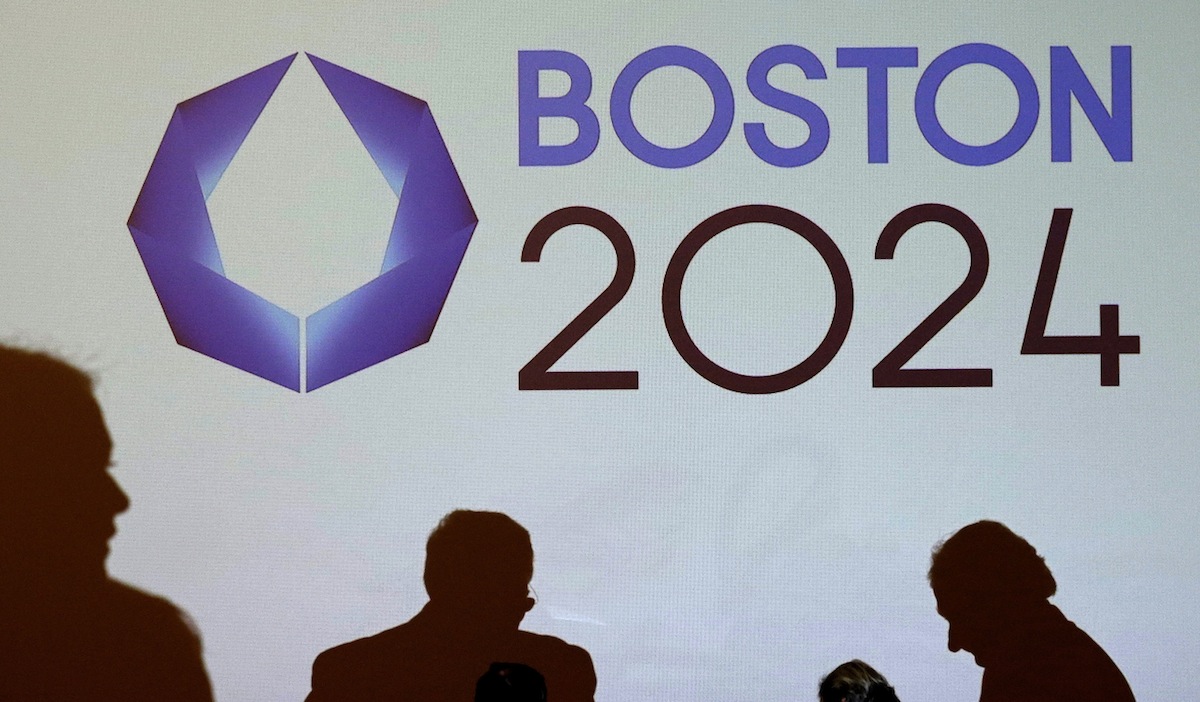Boston 2024’s Opponents Are More Well Known Than Boston 2024

Photo via AP
The latest poll on the troubled bid to bring the 2024 Summer Olympics to Boston is full of bad news for organizers and boosters of the movement.
Just 39 percent of respondents to the WBUR/MassINC statewide poll of Massachusetts residents expressed support for bringing the 2024 Summer Olympics to Boston, while 49 percent said they oppose the effort. The live telephone poll of 502 registered Massachusetts voters was conducted June 4-6 and has a margin of error of +/- 4.4 percent. The poll included landlines and cell phones.
Here are five takeaways from the crosstabs and toplines:
1. It’s summer and Boston 2024’s numbers are still under seven feet of snow.
When Boston was selected by the United States Olympic Committee as the country’s official nominee for the 2024 Summer Olympics, support for the effort was steady at 50-51 percent in and around Boston. Then winter happened, the MBTA stopped functioning, and support for the games collapsed much like so many snow-covered roofs around the region. One line of thinking, public and private, has been that once the snow melted and the sun shined people would back the games, but that has not happened. Support for the games has hovered at or under 40 percent since March. Boston 2024’s popularity problem cannot be solved by a simple changing of the seasons.
2. Boston 2024’s opponents are more well known than Boston 2024.
Opponents of the Boston 2024 effort have higher name recognition than Boston 2024 itself. Not only are they more recognized, but they are also more well liked than Boston 2024. Just 15 percent of respondents said that they had a favorable opinion of Boston 2024, while 34 percent said they had a favorable view of No Boston Olympics, the opposition group led by Chris Dempsey, Liam Kerr, and Kelley Gossett.
In an emailed statement, Dempsey said the poll numbers showed a strong, steady opposition to the games.
“This latest poll shows a continued drop in support for Boston 2024. It’s clear that the more voters learn about the boosters’ irresponsible bid, the less they like it. Massachusetts voters do not want to sign a blank check for Olympic cost overruns or revenue shortfalls,” Dempsey said.
Boston 2024 COO Erin Murphy expressed confidence that Olympic organizers will win over the public in an emailed statement.
“We’re confident that public support will increase when the specifics are available around how a privately funded games will bring the significant and lasting economic benefits and have a positive impact on affordable housing, transportation, and public infrastructure. Today’s poll shows support growing if some venues are placed across the state, which Boston 2024 has already started with last week’s announcement of sailing in New Bedford. We are working hard to finalize other details and plan to make them publicly available by the end of the month,” said Murphy.
Requests for comment from Boston City Hall and the USOC were not returned.
3. Support for the games grows when presented as a statewide event.
The only real positive out of this poll for Olympic boosters is that support for the games returns to pre-winter levels when presented as a shared, statewide event. Fifty-one percent of respondents said they would support a statewide games while 37 percent said they would oppose a Massachusetts Olympics. Boston 2024 has stated that their bid is evolving and more communities outside Boston are being eyed as possible homes for venues and facilities for the games.
4. Nobody knows who Steve Pagliuca is.
New Boston 2024 chairman and current Boston Celtics co-owner and Bain executive Steve Pagliuca has little name recognition among Massachusetts register voters. Paglicua, or as he is commonly known, “Pags”, spent $8,567,447 in 2009 on an unsuccessful run for U.S. Senate, ultimately finishing fourth in a four-way Democratic primary to challenge a then-unknown Beacon Hill backbencher named Scott Brown to fill the late Edward Kennedy’s seat. Of the poll’s respondents, 66 percent said that they had never heard of Pagliuca.
5. Southeastern Massachusetts is a pocket of support for Boston 2024.
The southeastern part of the state was the only part of the state that showed uniform support for the Olympics in Boston or as a statewide event. Forty-four percent of southeastern respondents said they want the games in Boston while 41 percent said they oppose them. When asked if they support the Olympics as a statewide event, an overwhelming 66 percent of southeastern residents said they would back the games.
Boston 2024 officials announced last week that they are moving proposed Olympic sailing events from Boston Harbor to New Bedford. Boston 2024 CEO Rich Davey called the change of venue a “slam dunk” move. Davey also hinted that it is likely that more Olympic venues will be moved outside of the Greater Boston area as Bid 2.0 is drawn up.

